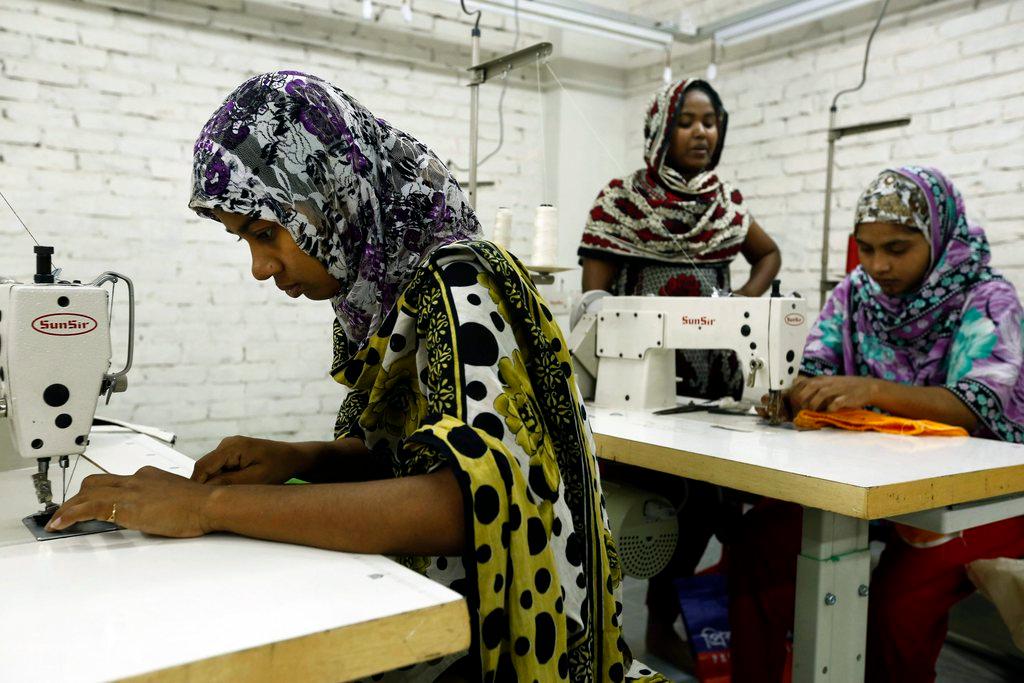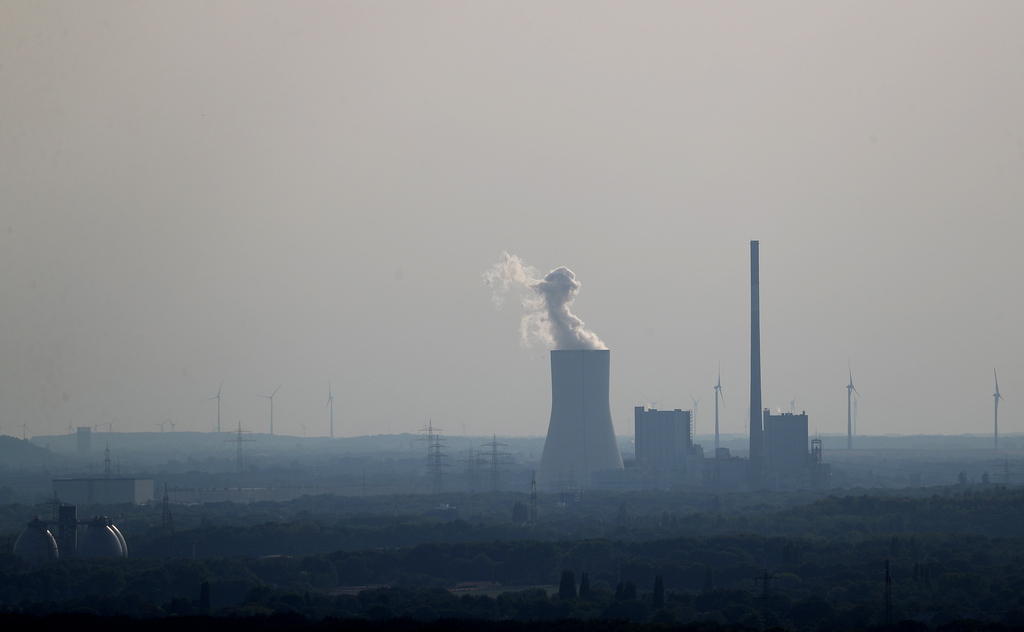Swiss pension funds feel society’s pull

The fallout from the deadliest garment factory accident in history shows the role that investors can have in changing business practices. Pressures have mounted on traditionally conservative Swiss pension funds to make an impact of their own.
In April 2013, more than 1000 factory workers died when the Rana Plaza garment factory complex in Bangladesh collapsed. After the tragedy, a coalition of 200 institutional investors called on fashion brands, including Basel-based Tally Weijl, to sign the Bangladesh Accord on Fire and Building SafetyExternal link – a legally binding treaty to address worker rights in the garment supply chain.
By most accounts, the effort has been a success. It has led to a massive increase in inspections, worker trainings, and building safety measures.
And in 2017, long after the consumer outcry and media attention had faded, investors successfully called for an extension of the treaty with more protections for workers. Among those investors were some Swiss pension funds such as Pensionskasse der Stadt Winterthur, the pension fund of the canton of Neuchâtel, and Prévoyance Santé Valais that are part of an engagement program by Ethos, a foundation made up of 230 Swiss pension funds and tax-exempt organisations.
It marked a change for Swiss pension fund investors, who had largely stood on the sidelines while many big North American and European funds made bold shifts towards responsible investing over the last decade.
Sabine Döbeli, the CEO of Swiss Sustainable Finance (SSF), says that Switzerland was one of the pioneers in developing responsible investment indices and impact investing but has since then been outpaced in the sector by other countries.
“Swiss investors are no longer at the forefront,” she notes. “This is particularly true of pension funds.”
Playing catch up
This appears to be changing, albeit slowly. SSF’s 2018 market studyExternal link released in May found that the total volume of sustainable investments in Switzerland increased by 82% in the last year. Pension funds now make up 40% of the CHF336.3 billion ($333.6 billion) invested by institutional investors.
Climate change and associated financial risks have been a major driver for this growth. Pension funds, as long-term investors, have an incentive to eliminate any financial risks to their assets from massive weather changes, new regulation, or shifting consumer preferences.
Stefan Beiner, head of asset management at Publica, the Swiss state pension fund, says that “more beneficiaries are asking questions about how Publica is mitigating investment risks related to climate change.” In August, researchers and professors from Zurich’s Federal Institute of Technology (ETH Zurich) called for Publica to divest from fossil fuels.
Around 2% of Publica’s balance sheet, or CHF800 million, is invested in companies operating in the fossil fuel sector.
Less is more
But most Swiss pension funds have been slow to embrace responsible investment compared to many other countries. “Historically, pension funds in Switzerland were quite conservative and mainly invested in real estate and bonds,” says Matthias Narr, a Senior Engagement Manager at Ethos Foundation. “There were only a few pension funds who had sustainability on their mind”.
This is partly due to the fragmented nature of the Swiss market, he explains. Many Swiss pension funds only have a few employees, and several don’t even have websites. They haven’t had the capacity or expertise to take on environmental, social or governance (ESG) issues and so have largely remained passive investors according to Narr.
CALPERS, one of the largest pension funds in the United States, manages $350 billion in assets compared to CHF40 billion managed by Publica, the largest pension fund in Switzerland.
+ Read more about the three pillar Swiss pension system
More consolidation in the industry is helping address these gaps. Today there are about 1,650 pension fundsExternal link that are part of the workplace pension schemes in Switzerland compared to 2,950 in 2004. There are also around 100 collective foundations, known as “Sammelstiftungen” in German, that pool pension assets. Collectively, pension funds are the biggest investor group in the country with about CHF900 billion under management – more than the country’s GDP.
Regulation as an ally
Other countries have also moved faster than Switzerland because their governments have taken a more active role in promoting responsible investment. For example, in 2015, France became the first country to introduce mandatory climate change-related reporting for institutional investors. Since 2014, the Code of Dutch Pension Funds obliged boards of trustees to ensure that their investment policies include an explanation of how funds account for environmental and human rights issues.
The European Union’s revised Institutions for Occupational Retirement Provision,External link which will go into effect in 2019, mandates for the first time that pension schemes evaluate and disclose risks such as climate change and resource scarcity.
In Switzerland, there is currently no law on how sustainability should be dealt with by pension funds. But that shouldn’t exclude it from an investor’s duty, Narr points out. On October 21, the Swiss Climate Alliance unveiled a legal opinionExternal link confirming that climate risks should be included in the investment policy of pension funds.
Narr argues that the Swiss investment sector is especially held back by the lack of a government-backed entity promoting sustainability in the financial sector. For example, the Bank of England plays such a role in the UK. The Swiss National Bank, which could serve as such an entity, has been criticised for its investments in high-polluting industries.
The Minder “executive pay” initiative adopted by Swiss voters in 2013 has been the only obligation put on pension funds related to ESG issues. It gives shareholders of listed firms a vote on corporate executive pay, outlaws various types of compensation, and requires pension funds to vote on their Swiss equities held directly.
Taking a page from diplomacy
Claude Amstutz is a senior advisor at WWF Switzerland, which is working on the second edition of a report rating the responsible investment practicesExternal link of the 20 largest pension funds. He says that pension funds have “huge leverage to steer assets away from environmentally and socially harmful activities towards a more sustainable future”. As Switzerland’s parliament continues discussions on a counter-proposal to the Responsible Business Initiative, pension funds could turn out to be a powerful ally of the responsible business agenda.
Divestment has been a key strategy. Publica and several other pension funds have divested from coal. The Swiss Association for Responsible Investments (SVVK) has created a recommended exclusion or blacklist of controversial weapon manufacturers.
Pension funds have increasingly turned to a more diplomatic responsible investment approach that involves seeking dialogue with companies. Ethos FoundationExternal link, for example, has a mandate to engage with the 150 largest companies in Switzerland on behalf of 130 Swiss pension funds. This engagement program has pushed Swiss companies to establish codes of conduct as well as climate change reporting, which are increasingly widespread.
“Engagement is not the fastest approach,” Beiner admits. “It takes time but it helps, for example, increase transparency and encourage better practices.”
Beyond climate
Globally and in Switzerland, social issues such as human rights have been in the shadows of climate change and governance. Most investors still don’t see human rights as a financial risk.
“The real challenge is the availability of quality data,” explains Beiner. Some investors are trying to address the data gap. Last year, investors with $5.3 trillion in assets under management pushed for the creation of a corporate human rights benchmark.External link
In September this year, several Swiss pension funds signed a statement External linkcalling for jewellery and watch companies, including Swiss-based IWC Schaffhausen and Hublot, to address human rights abuses in their supply chains.
Time will tell if such engagement practices lead to changes in the vein of the Bangladesh Accord. So far, neither Swiss watchmaker has provided a response, according to Paloma Quick Munoz of the Investor Alliance for Human Rights.
Swiss Pension Fund System
The Swiss social security system is based on three pillars. The first pillar is the basic state old-age and survivors’ insurance scheme (AHV/AVS). It grants pensions of two basic types: old age pensions to people of retirement age, and survivors’ pensions to spouses or dependent children of a deceased insured person.
The second pillar is the occupational pension scheme. For every employee earning an income of at least 21,060 Swiss francs, insurance under the second pillar is a mandatory requirement. Most of the discussion on responsible investment is focused on pension funds that are part of this pillar.
The third pillar refers to voluntary pension schemes, which are made up of personal savings and investment plans.

In compliance with the JTI standards
More: SWI swissinfo.ch certified by the Journalism Trust Initiative






You can find an overview of ongoing debates with our journalists here. Please join us!
If you want to start a conversation about a topic raised in this article or want to report factual errors, email us at english@swissinfo.ch.